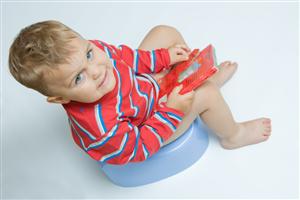“My almost 3 year old has been potty trained for a year. Lately, it’s been fun to pee down his heating vent in his room. This morning, he really pushed me to my limit when I came out of the shower and realized he had peed on his 9 month old brother. And then when I put him in time-out in his room (instead of spanking him, which is really what I wanted to do) he peed in his heater vent again. I feel like I try to be a good parent, so I don’t know what I’m doing wrong. How much more love and affection can I give him? We’ll start a sticker chart today and hope that works. Because once you pee on your brother, you’ve gone too far, and we have to fix this now. “

I couldn’t agree more with this mom: When you pee on your brother, things have gone too far. But I don’t think a sticker chart — or a spanking — will work. Why? They don’t get to the root of the problem. The root of the problem is that Mom got a replacement for him. Clearly, he is not good enough, or why else did she need another boy? As my three year old son said before our second child “We don’t need another boy. If it’s a boy, we can send it back, right?“
This little guy defines “acting out” which is a word often used to describe misbehavior. He’s “acting out” feelings he can’t express in any other way. He might not even be able to express those feelings to himself, but they’re bursting out and making themselves known, as feelings have a way of doing (even when they’re repressed. In fact, particularly when they’re repressed!) Male mammals often pee on things to stake out their territory and warn off intruders. This is a common passive-aggressive way for children to vent anxiety, resentment and anger that they can’t express in any other way. But I’m betting it’s also a way to stake out territory. And from the fact that he peed on his brother, we can guess who the resented intruder is!
What’s a parent to do? Let’s consider our options.
1. Spank him.
We’re angry. We’re shocked. We want to lash out. He deserves it! This will teach him a lesson!
Actually, the lesson spanking will teach is that violence is how we solve problems. Research shows that kids who are spanked are much more likely to hit others. We can count on spanking to help our toddler graduate from peeing on his brother to slugging him. This Mom deserves huge cred for restraining her perfectly understandable rage.
2. Put him in timeout.
His behavior is outrageous. He has to learn a lesson. I agree. But let’s consider what lesson time out teaches.
Timeout gives a clear message: You have done something that made me very angry. (Okay so far.) At the age of three, you probably don’t understand why you did this or how to manage your own emotions so you won’t do it again, but I am not going to help you with those seething emotions. You’re on your own, Buddy. (Not so good. He’s not capable of working through these emotions on his own. That’s why he’s peeing on his brother. He’s showing you he needs your help.) And maybe if I scare you with my anger and reject you with this symbolic abandonment you’ll get the message that I might stop loving you, and you’ll be terrified enough to stop this outrageous behavior. I don’t like scaring you, but things really have gone too far.”
Well, we do agree that things have gone too far. But triggering a two year old’s most primal terror — abandonment — is like using the nuclear option. You might get your way, but the scorched earth you leave behind makes for much bigger problems.
Will he stop peeing on his brother? If he gets punished a lot, then this punishment will have no effect, because his heart has already been hardened to his mother. He believes that she has already given up on him, so his fear and anger are bursting at the seams and pushing their way out. He feels that he’s being misunderstood and unfairly penalized by mom and her nine month old new favorite, but he can at least assert some control over something in his life — his own pee! Of course, he will get more secretive about it now, and he will master lying: “Pee in your purse? Of course I didn’t do that, Mom. It must have been the baby.”
What if he doesn’t usually get punished, maybe has never even had a timeout until today? In that case, the timeout will be terrifying and therefore effective. Lose Mommy’s love? Nothing is more important than Mommy’s love. Without it, he would quite literally die — from not being touched, as much as from not being fed. NO MORE PEEING ON THE BABY! He’s got it, loud and clear. But he’s got another message, too: “I am a bad person. If I were good I would not be on the naughty step. If I were good I would not be peeing in bad places. If I were good I could stop myself. If I were good I would not have these angry feelings. If I were good Mommy would not be mad at me. If I were good, Mommy wouldn’t have gotten a replacement. I am a bad person even though I will pretend to be a good person so Mommy will love me. I have to hide from her who I really am, how bad I really am. It’s all the baby’s fault. If it weren’t for that baby, Mom would still love me like she used to.”
At the end of timeout, he will be able to tell Mom exactly why he got put in timeout. He will promise never to pee on the baby or down the heating vent again. He will hug Mom. He may even awkwardly hug the baby. Everything is good, right?
Except that repressed feelings don’t go away. They just aren’t under conscious control, so they burst out, despite a person’s best conscious intentions. So tomorrow, what will happen to all those angry feelings pushing against his insides, magnified now by the shame that he is truly a bad person? His anger at the baby now ripens into hatred. And Mom expects him to like this baby, who is now nine months old and crawling and messing with his things and charming everyone with his smiles…Enough to make you want to slug him! Which is exactly what will happen, once peeing is not an option. Not to mention defiance against mom, throwing things when he’s mad, maybe nightmares and wetting the bed…..
Are you saying to yourself, “Just from a timeout? She seriously expects me NOT to put my kid in timeout when he pees on the baby, and says that if I do he will start hitting his brother and being defiant?”
Well, the research does suggest that’s a likely outcome. When you use timeouts (or any other “love withdrawal” technique), children feel rejected, bad about themselves, disconnected from us. That means they are more likely to misbehave. When you ask them to repress their anger at their siblings, the anger bursts out sometimes, beyond their control, in physical aggression. When you don’t help them deal with their anxieties and fears, they have nightmares.
But I am NOT suggesting that you just let your son pee on the baby. We’re not out of options yet. In fact, we have some that are much more effective than punishment. Which we’ll discuss in the next few blog posts. Stay tuned.
***
Wondering what research I’m referring to? Here are just two studies. There are many more.
A study done by the National Institute of Mental Health[i] concluded that timeouts are effective in getting toddlers to cooperate, but only temporarily. The children misbehaved more than children who weren’t disciplined with timeout, even when their mothers took the time to talk with them afterward. Michael Chapman and Carolyn Zahn-Wexler, the authors of the study, concluded that the children were reacting to the perceived “love withdrawal” by misbehaving more. That’s in keeping with the studies on love withdrawal as a punishment technique, which show that kids subjected to it tend to exhibit more misbehavior, worse emotional health, and less developed morality [ii]. These results aren’t surprising, given how much children need to feel connected to us to feel safe, and how likely they are to act out when they don’t feel safe.
[i] Chapman, Michael and Zahn-Wexler, Carolyn. “Young Children’s Compliance and Noncompliance to Parental Discipline in a Natural Setting.” International Journal of Behavioral Development 5 (982): p. 90.
[ii] Hoffman, Martin. (1970) “Moral Development.” In Carmichael’s Manual of Child Psychology, 3rd ed., volume 2, edited by Paul H. Mussen. New York: Wiley.
Source: Aha! Parenting Blog






Leave Your Reply